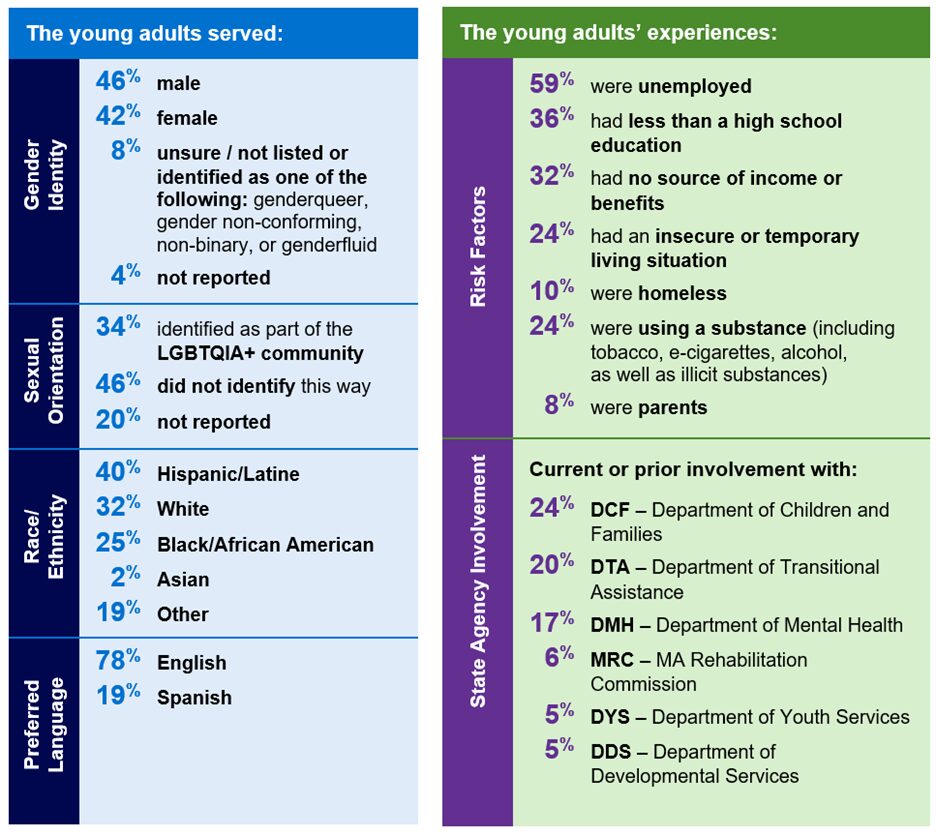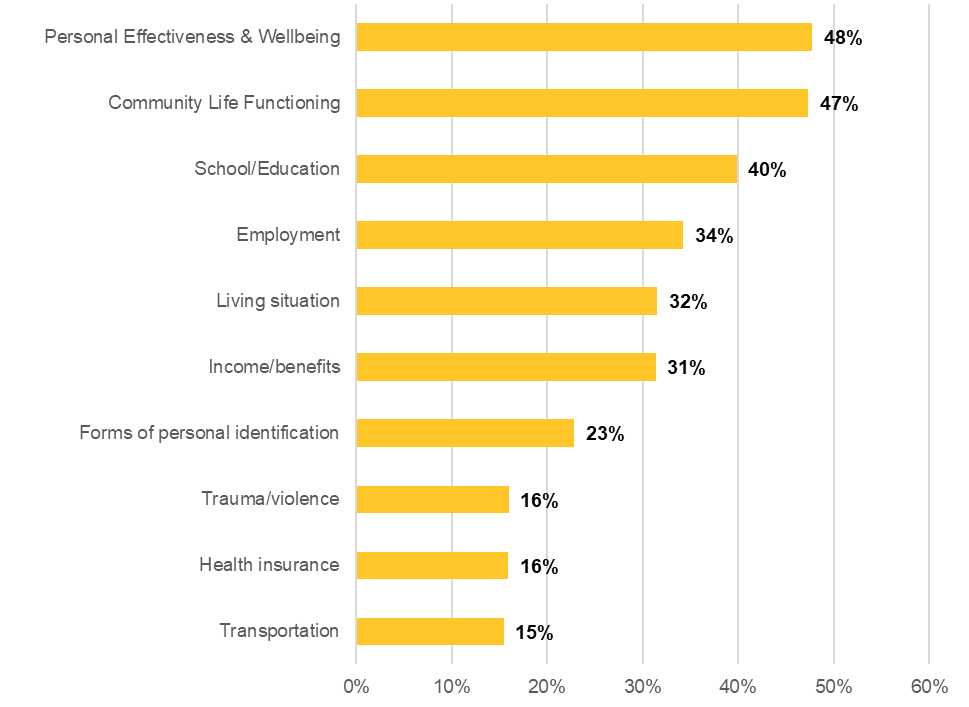The Massachusetts Department of Mental Health (DMH) Young Adult Access Centers are unique community spaces that serve young adults with mental health and co-occurring behavioral health concerns and support them with their transition to adulthood. These 10 Access Centers are tailored to young people ages 16 to 26, and provide drop-in services, person-centered peer mentoring, and behavioral health assistance without the need for a clinical referral or health insurance. Staff at the Access Centers includes peer mentors who are trained in evidence-based and -informed practices. The areas of support (e.g., employment, personal-effectiveness and well-being) provided by the Access Centers are modeled on the evidence-supported Transition to Independence Process (TIP) Model.1 With state funding and federal grants, Access Centers are run by community-based agencies in high need areas across the state. All services are free.

Young adults served by the Access Centers
Young adulthood is when most behavioral health issues emerge, complicating a successful transition to adulthood.2 Access Centers prioritize young adults with a higher risk for behavioral health concerns, particularly when they experience co-occurring substance use concerns, are not actively engaged in services, or experience other significant challenges: transitioning from juvenile justice supervision or foster care; pregnant or parenting; homeless or at risk of homelessness; unemployed or marginally employed; struggling in school or have dropped out; commercially and sexually exploited; are without a caring adult.
The Access Centers are affirming and inclusive spaces that provide:
- Peer mentorship and support from young adults with similar lived experiences.
- Trauma-informed behavioral health services.
- Social activities and a community that offers a culture of belonging, refuge, and opportunities for growth.
- Linkages to needed community services.
- Evidence-supported interventions (e.g., TIP) empower young adults to identify goals and develop and support plans to achieve these goals.
- Amenities and resources to meet basic needs, such as computer and internet access, personal hygiene facilities (e.g., showers and laundry), and stocked kitchens.
Evaluation of the Young Adult Access Centers
ForHealth Consulting at UMass Chan Medical School provides continuing evaluation support for the Access Centers by describing the population utilizing the Access Centers, tracking referral sources, monitoring service delivery, and reporting on young adult progress in key domains.
Data are collected and managed using a secure electronic database hosted at UMass Chan Medical School.6 Service data are provided by Access Center staff. For all other information, Access Center staff are asked to collect the data directly from the young adults. All data collection materials are available in English or Spanish.
This article presents data on who used the Access Centers in 2023, what their needs and challenges were, what services they received, and their progress over time.
Young Adults Served
A primary goal of the Access Centers is to engage young people who have not had their needs met elsewhere. In 2023, the 10 Access Centers served 1,292 young adults who engaged 13,074 times. Engagements include interacting with Access Center staff, participating in Access Center programming, or using the Access Center facilities. Thirty-nine percent of young adults engaged once with the Access Center; 22% engaged two to five times, 39% engaged six or more times.
Demographic data and data about current and past lifetime experiences that may influence the transition to adulthood are collected during an initial assessment.
Supports Sought by Young Adults
In 2023, young adults most often came to Access Centers seeking support for employment (49%), personal-effectiveness and wellbeing (37%), living situation (35%), education (34%), and community-life functioning (29%). Personal-effectiveness and wellbeing includes interpersonal relationships, emotional/behavioral wellbeing, self-determination, communication, physical health and wellbeing, and parenting. Community-life functioning includes daily living skills, leisure-time activities, and community participation.
Service Engagement
Young adults choose the services they receive and how they access them. Access Centers offer drop-in hours, groups, individual support services such as TIP and Peer Mentoring, and a variety of other options. The most frequent services provided by Access Centers include drop-in services, recreational activities, amenities, and check-ins with staff.
Approximately three-quarters of the young adults used drop-in services and participated in recreational activities, and over half used the amenities, checked in with staff, and took a tour/learned about the services offered. Of all one-on-one or group engagements provided in 2023, 37% provided support for young adults’ emotional/behavioral wellbeing; 29% of the young adults who engaged in these services received emotional/behavioral wellbeing support.
Progress Made by Young Adults
Progress Measures – Changes in a young adult’s situation, such as obtaining employment or housing security, can take time to occur, and often, there are smaller steps young adults take toward those goals. Approximately every three months while young adults are engaged at the Access Center, they are asked whether improvement has been made in each domain of interest.

Percentage of young adults that had an improvement in domains with most improvement overall
Access Centers’ Young Adult Self-Assessments – Access Centers receiving funding from federal grants are required to participate in the National Outcome Measures (NOMs) Client-Level Services Tool.7 The NOMs tool collects data on life functioning, housing stability, education, and employment status, criminal justice history, perceptions of care received, and social connectedness. The tool is administered by Access Center staff at baseline and again approximately six months later to young adults who consent to participate in the NOMs interview.
Table 1 shows the percentages of young adults that either maintained a high rating or improved their rating for specific NOMs questions or domains made up of multiple questions. Although the findings are encouraging, due to the small sample of young adults participating in the NOMs, these findings may not be generalizable to all young adults across all the Access Centers.
Young Adult Satisfaction with Services
Young adults served by the Access Center express very high levels of satisfaction with the services they receive on the NOMs and in testimonials. For example, 99% of NOMs respondents said they would recommend the Access Center to a friend or family member and 97% said they would still get services from the Access Center if there were other choices. Young Adults describe the impact of the Access Centers on their mental health and social connectedness, as well as on obtaining critical life skills and support.
“[Access Center] has notably improved my mental health and quality of life. Connecting with people and getting out are very important to me and my mental health, both of which are provided by [Access Center] with the space to meet new people hang out with friends, as well as groups and future events to look forward to.” – Young Adult
“It’s really great that this place is a safe place, and at the same time, not only can you like make friends and just like chill but they help you with things. For example, I got my permit because I came here, I got my GED because I came here, and I’ve gotten jobs because I came here.” – Young Adult
Summary
The transition to adulthood is a time of inherently great change in a young person’s life. This transition is compounded when young adults face systemic barriers and forms of discrimination that negatively impact their mental health and wellbeing. The Massachusetts Young Adult Access Centers are successfully reaching a diverse group of young people and supporting them in their transition to full and healthy adult lives. Young adults served by the Access Centers are looking for and receiving support with personal effectiveness and wellbeing, community life functioning, education, employment, living situations, and financial security. Although this evaluation does not test the direct impact of the Access Centers on the lives of the young adults they serve, the initial assessment indicates that this population greatly benefits from the support and services provided by the Access Centers.
Funding Acknowledgement
Development of this report has been supported in part by SAMHSA Grant H79SM084011 from the Center for Mental Health Services, Substance Abuse and Mental Health Services Administration, U.S. Department of Health and Human Services. The views and opinions contained in the publication do not necessarily reflect those of SAMHSA or the U.S. Department of Health and Human Services and should not be construed as such.
Holly Swan, Carter Pratt, Michael Vassello, and Gustavo Carvajal are from ForHealth Consulting at University of Massachusetts Chan Medical School. Betsy Edes and Heidi Holland are from the Massachusetts Department of Mental Health.
Footnotes
- Dresser, K., et al. (2015). Implementation of a Positive Development, Evidence-Supported Practice for Emerging Adults with Serious Mental Health Conditions: The Transition to Independence Process (TIP) Model. The Journal of Behavioral Health Services & Research 42(2): 223-237.
- Curtin, S.C. (2020). State Suicide Rates Among Adolescents and Young Adults Aged 10–24: United States, 2000–2018. National Vital Statistics Report, 69(11).
- Ramirez, A.G., Gallion, K.J., Aguilar, R., & Surette Dembeck, E. (2017). Mental Health and Latino Kids: A Research Review, Robert Wood Johnson Foundation. Retrieved from: https://salud-america.org.
- Hafeez, H., Zeshan, M., Tahir, M.A., Jahan, N., & Naveed, S. (2017). Health Care Disparities Among Lesbian, Gay, Bisexual, and Transgender Youth: A Literature Review. Cureus, 9(4): e1184. doi:10.7759/cureus.1184.
- Chang, A.R. & Slopen, N. (2023). Racial and Ethnic Disparities for Unmet Needs by Mental Health Condition: 2016 to 2021. Pediatrics, 153(1): e2023062286.
- Harris, P.A., Taylor, R., Thielke, R., Payne, J., Gonzalez, N., & Conde, J.G. (2009). Research electronic data capture (REDCap) – A metadata-driven methodology and workflow process for providing translational research informatics support. J Biomed Inform, 42(2):377-81.
- Substance Abuse and Mental Health Services Administration (SAMHSA), Center for Mental Health Services (CMHS), National Outcome Measures (NOMs) Client-Level Measures for Discretionary Programs Providing Direct Services, Services Tool. OMB No. 0930-0285 Expiration Date 03/30/2025. Available at: https://spars.samhsa.gov/sites/default/files/2022-09/CMHSNOMSToolEnglish.pdf



